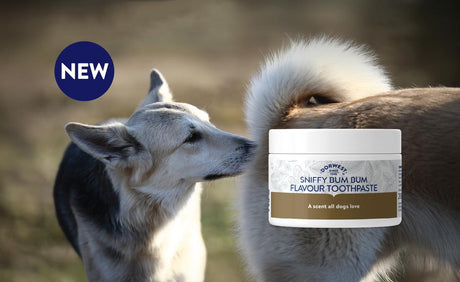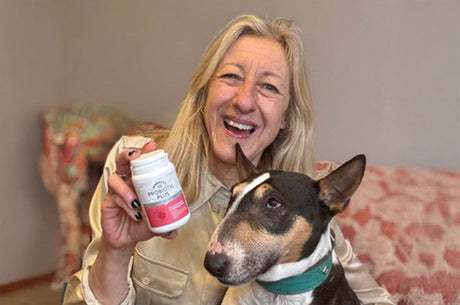
“Why do dogs bark?” is a question most owners will ask themselves at some point in their lives. There can be many reasons for why your dog barks a lot. It can be due to fear or frustration, worry at being left alone, joining in with their neighbourhood canine friends, or due to a breed trait. Barking is one of the more challenging behaviours for us humans to deal with. A dog that barks a lot can be quite stressful to live with, particularly if your neighbours aren’t very sympathetic.
Understanding the type of bark
In order to know why dogs bark, we must first distinguish the type of bark it is. A dog’s bark is made up of a short and repetitive sound. The sound itself can vary depending on your dog’s mood or needs - changing in auditory structure or number of repetitions. Barking is a normal part of canine communication. It’s used alongside other vocalisations; body language; and the use of their olfactory (scent) system. However, ‘inappropriate’ or ‘unwanted’ barking - too loud or too often - is one of the most commonly reported challenges owners have when sharing a home with their dogs. In fact, nuisance barking can also be deemed anti-social to those outside of your home and, by law, a 'statutory noise nuisance'.
The most important thing to work out is the reason WHY dogs bark. Once we know that, we’ll be much better equipped to help reduce it.
Releasing built up emotions
Did you know that barking actually feels good? Some dogs may bark a lot to not only relieve stress but also to boost endorphins when they feel uncomfortable in a situation. Barking can also be due to something underlying that’s going on physically. You can support some of these physical issues by incorporating herbal pet care into their diet. But if you feel that there is something wrong, we always recommend you take your dog to a veterinary professional.
Your dog may not be barking mad after all

We can sometimes be part of the problem too. We unintentionally reinforce the behaviour by talking to our dogs every time they bark - creating a two-way conversation. And, of course, they could just be doing the job they were bred for. We know that some breeds are more inclined to bark, having been selectively bred to vocalise at specific times. For example, in our hounds and terriers who were used for active hunts.
We’re going to walk through some of the ways we can help reduce our dogs' barking if your dog barks a lot. But first, it’s really important that we don’t punish the bark. By adding in our own negative responses, we can increase our dog’s stress level, which in turn increases their need to bark. Shouting at your dog can also impact your bond. And the use of anti-bark collars that vibrate or spray liquid may actually increase the likelihood of barking - if not while wearing the collar, then after it is removed.
Barking in the Home
If you have a busy road outside your home that causes your dog to bark a lot, then try to reduce the visual stimulation. You can do this by changing the room your dog spends time in and this can help them be less vigilant about passers by. Putting frosting on your windows is another good way of blocking visual stimulation. This can help enormously, especially if you work from home, to reduce territorial or alert barking.
Adding in white noise or consistent, calm music can also help to block out disturbances such as car doors closing or people talking as they move past your home. A continuous sound is going to be more effective than television or radio which have variable tones.
If your dog only barks when they’re left home alone, it might be that they’re dealing with some sort of separation anxiety or frustration. Our Scullcap and Valerian Tablets for Dogs are a great way to support your dog. This herbal pet care remedy will help them to feel naturally relaxed, alongside a behavioural plan to help your dog grow in confidence with solo time. Check out our expert series of training videos for more ideas on supporting your dog with separation related challenges.
Barking in the Garden
If your dog spends a lot of time in your garden, you may see an increase in socially facilitated barking or allelomimetic behaviour. This is where they join in barking alongside other dogs in your neighbourhood. In this case, we want to focus on other outside activities. Start with limiting time spent in the garden to only when you’re having dog-to-human interactions such as training or play. You could also consider creating a digging pit as an alternative way for your dog to relieve stress or frustration. Or some simple sniffing activities such as sprinkling treats on your lawn is a great way to engage your dog’s nose instead of their bark.
Creating an inner-boundary between your fence and your garden is useful if your dog performs fence-running with a neighbouring dog. This allows some “dead space” to be created so the dogs cannot get right up near to each other by your fence.
Barking on Walks

If you’re wondering why your dog barks on walks, it might be that they’re getting anxious or frustrated. Or it could just be that they're so excited to be out in the world they want to tell everyone about it! Whatever the reason, work on boosting your connection on dog walks. This can be by playing games, adding in sniffing time by hiding treats in long grass, or working on your recall training. Keep a journal of your walks (and how much your dog has barked on each one). It can also be a useful way of tracking if your dog finds some spaces more difficult to walk in than others. This allows you to find the calmest spaces for your dog to work in first. For highly anxious dogs, a rest day every now and then can also be helpful. Take a day off from walks and focus on indoor activities instead.
Barking in the Car
When your dog barks a lot in the car it can make things a little more dangerous - as it can be very distracting for the driver. Barking in the car can be due to excitement, unease, or even territorial reasons. Blocking out visual distractions by using a child’s sunscreen or covering the sides of your crate with a blanket can be really helpful. Playing relaxing music while driving with your dog and giving them something to chew while you travel can also help reduce their arousal. If they are regularly made anxious by car travel, try natural remedies for dog anxiety such as our Valerian Compound. Formulated by experts in herbal pet care, this can help to relax them in just 30 minutes. You could also try swapping where your dog travels to see if that makes any difference. But whether they’re in the boot or the back seat, safety is paramount so invest in a crash-tested harness or crate.
Boost your Dog’s Mood
Overall, happier and more relaxed dogs are less likely to bark. Both chewing and sniffing activities can boost endorphins which helps our dogs feel great! The added bonus for both of these activities is that for MOST dogs, they won’t be able to bark if they’re chewing or sniffing, which also gives your ears a break. If your dog is particularly anxious you can also help them by giving them anxiety tablets for dogs, this natural solution won’t harm your pet but will lessen activity in the nervous system, instead of relaxing muscles.
Short training sessions with your dog can also be helpful to boost your bond and give them something positive to do. Teaching your dog to go to a bed on cue or to retrieve a toy for you can also be really useful when it comes to barking. You could then pair these as an alternative activity for your dog to do when the doorbell rings.
So to answer the question, “why do dogs bark?”
There can be a number of reasons why your dog is barking. It’s important to pay attention to their surroundings when they are doing so. We hope these tips have given you an idea of why they might use their voice and also how you can help support them to feel more relaxed. Does your dog bark a lot because they like the sound of their own voice or are they trying to communicate some important emotions with you? There are so many ways we can help support our barking dogs. This can help you both enjoy a quieter and more relaxed life together moving forwards.
For more ideas on how to support your dog, check out Caroline's other behavioural videos:
Separation Anxiety - https://www.youtube.com/watch?v=cfdfJ4n1JaQ&t=33s
Puppy 101 - https://www.youtube.com/watch?v=bEuqMEkSym8&t=2s
Travel Anxiety - https://www.youtube.com/watch?v=o30rcF88_2o&t=268s
Trick Training - https://www.youtube.com/watch?v=rRLeRtHrdyU&t=108s
You can also get further help through Caroline’s ‘Break the Barking Habit’ self-paced online course. Our Dorwest community can save 30% with discount code: DORWESTHERBS.

Written by Caroline Wilkinson, Certified Animal Behaviourist & qualified dog trainer
Get support and advice from herbal pet care experts
If your dog needs a little more support and would benefit from trying some of our dog supplements, take a look at what we have available online. Our team are experts in herbal pet care and are more than happy to help. Contact us on +44 (0) 1308 897 272. Alternatively, email us at info@dorwest.com or fill out our online contact form.







